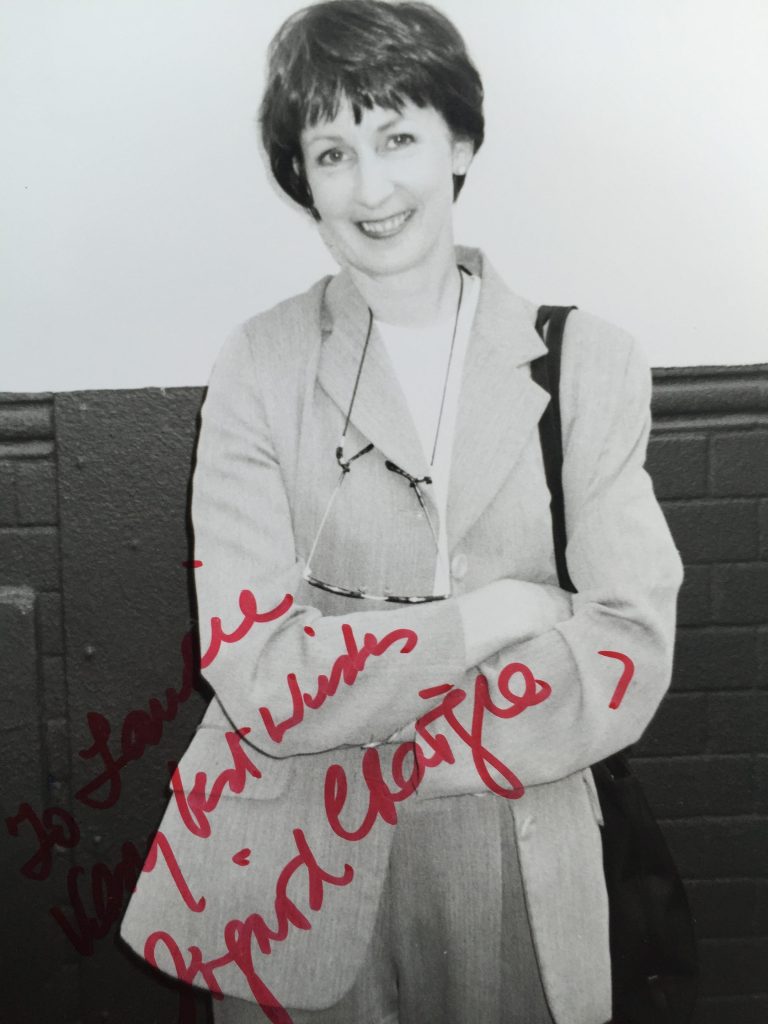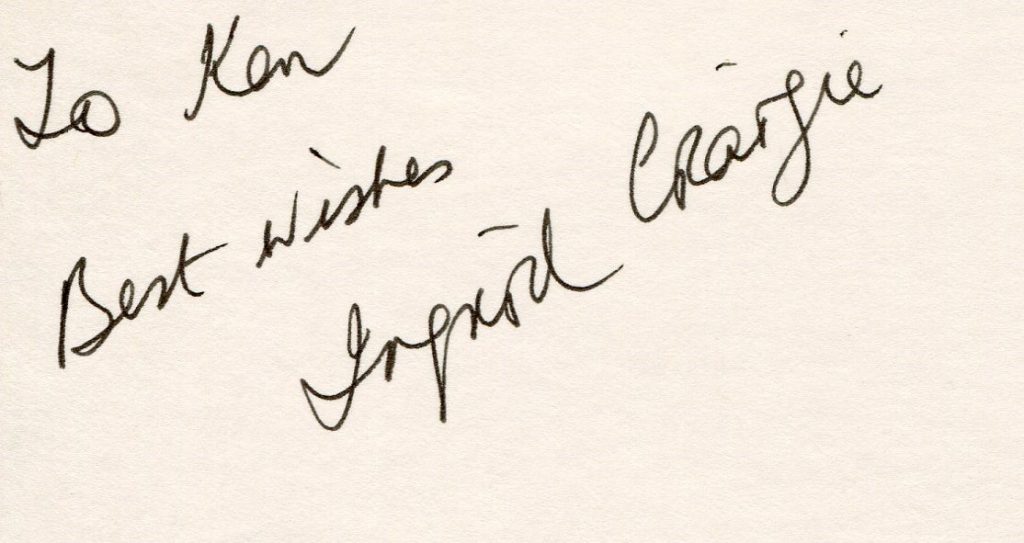

Ingrid Craigie was born in Dublin. She is a profilic stage actress and acted on Broadway in Brian Friel’s “Dancing at Lughnasa” in 1990. She played Ennie Mackie in “The Ballroom of Romance” in 1982 and starred opposite Martin Sheen in “Da” in 1988.
Ciara Dwyer’s interview in “Independent.ie”:
Craigie is cheerful about her life and her work. On Wednesday, she will be back at the Gate reprising her role of Grace in Brian Friel‘s Faith Healer.
For many years I have been mesmerised by Craigie’s talent. She can do comedy (Coward, Mamet), she was the fragile cripple Laura in Tennessee Williams‘s The Glass Menagerie. But she does passion too. In Terence Rattigan‘s The Deep Blue Sea, she was spellbinding. In Billy Roche’s Poor Beast in the Rain, she played the village tart in a mini almost up to her crotch, with an attitude to match. Her performance in Faith Healer was breathtaking in its heartache.
“I first saw it with Donal McCann,” she says. “I saw it three times. It’s been my favourite play ever since. I think it’s an extraordinary piece of work. I was quite young when I saw it but I’ve never seen anything quite like it. I remember coming out of it shaking because you give so much energy to a play like that as an audience.”
The play is comprised of monologues. Faith healer Frank Hardy tells his story, then his manager Teddy gives his version, as does his partner Grace. It is an unsettling play, but powerful in its honesty about human suffering. “Grace is in deep crisis and I think she’s desperately trying to stay alive,” says Craigie. “She has an all-consuming love for Frank that is quite unhealthy, but she’s also got resilience.”
The first time Craigie played in Faith Healer was at the Gate in 2006 whenRalph Fiennes was Frank Hardy. The play was booked out before they opened and Ingrid, while appreciative of the packed houses, looked on the circus of Fiennes‘s fans with amusement.
“One night the three of us went out for dinner and as we came out of the restaurant a woman saw Ralph and said ‘yum, yum’. It was extraordinary.”
She was disappointed that she was not able to go to Broadway with the production — due to various complications including American equity demands — but she did not dwell on it. When she did the role again last year with Owen Roe and Kim Durham, it was another production and she relished it. She is not the sort of person who lets disappointment blight her life and her optimism stems from a happy childhood.
Ingrid was born in Cork but her family moved to Dublin when she was one. Her father George was in the Army, in the bomb disposal unit. He was a colonel, and she describes him as “an honourable man”. She has one older brother. They lived in Swords and then they moved to Finglas, where she grew up. Her grandfather founded Merville dairy in Finglas, which was later to become Premier dairies. When her grandfather died, her family lived in his house.
“When I was about six I thought I’ll be a colonel in the Army because that’s what my father was. He said, ‘Well, there are no girls in the Army at the moment’, so I thought that career had gone. He would never have said you can’t do that.”
Ingrid went to Alexandra College, which at that stage was in Earlsfort Terrace. “It was a Church of Ireland liberal school, academic and we had great teachers. I loved languages. We had a drama teacher Nora Lever and she was an actor. She had her own drama company and she used to put on Shakespeare for schools. One day she said to me, ‘you can be an actor’. That was fantastic. I didn’t know how to do that. Although my mother is a great singer and has a very outgoing personality I didn’t have any family background in acting. I used to do assistant stage manager for Nora and played the maid in her productions. I started going to the theatre with friends. I remember making my parents bring me to see Borstal Boy at the Abbey and being blown away by that and realising then how theatre is not just entertainment. It’s like reading a novel and it opens up other worlds to you.”
In school, it was always assumed that Ingrid would go to university. She studied English at Trinity and got involved in Players. As a schoolgirl, she had seen many productions there. While in her final year at Trinity, she was involved in the Abbey, doing walk-on parts. Then she finished college and plunged into the Abbey. Eventually the roles got bigger. She admired Sorcha Cusack and Dearbhla Molloy and acted alongside greats such as Joan O’Hara. Tomas MacAnna was in charge at the time and he was very paternal, looking out for her, helping her get a few bob and telling her that she was understudying all the female roles.
“I was dying to go on,” she says. Her first big role was in Thornton Wilder‘s Our Town, alongside Stephen Brennan, and on and on she went. Her mother Betty was worried that the acting life would be an unstable one, but Ingrid was determined.
“I was a feminist from an early age. I always wanted to be independent. I think I got that from my mother. She should have been a working woman, in the sense of having a career, but when she was growing up it was a different time. She was very bright and she wanted to be a chemist and her father said, ‘You don’t want to do that because you’ll get married’. That was the way it was, unless you were incredibly determined or rebellious.
“My mother did a lot of voluntary work for the Multiple Sclerosis society but she was never paid. She could have done loads of things. She could have run businesses and would have been a fantastic agent. I think I saw that and I thought I’m not going to be stopped doing something. I always wanted to be able to look after myself and not to be dependent on a man. Not that she was dependent on my father. It was never like that.”
While acting, Ingrid worked alongside Ray McAnally and Cyril Cusack, both were generous in passing on invaluable tips in stagecraft. Cyril became a great friend, and it was while having dinner with him and some friends that she met his son, Paul, who went on to become her partner. They were together for 20 years.
“Although I was always independent in the relationship, when that broke up, my life became very different. It wasn’t going to be the two of you, with one person with a solid pension and an income. All of a sudden I was in my late 40s and it was just me.”
Were they ever going to get married and have kids? Or was that not the plan? “It wasn’t that it wasn’t the plan. I never said I won’t. It was just one of those things that didn’t happen for various reasons. Our relationship finished. I think it’s very sad when people have been in a long relationship and look back and think what a wasted life. I feel very fortunate to have been with someone who is worth loving. He is a wonderful person and he and his wife Elma are very good friends of mine. (They married nine years ago.) I adore them both. I would do anything for them and they would do anything for me.”
But don’t people think this odd? “People have fixed ideas but how can you think that way? Otherwise I chose someone really stupid to love for a long time and he would have been the same. I think we make choices about how we respond to things sometimes. I think it’s a danger when relationships break up that people want to take sides. People want to blame somebody and in the beginning they were very shocked that we got on so well. But there’s no reason for us not to get on well.
“We’re both very fortunate and both very happy with other people. I’m still very close to the family. Sorcha (Paul’s sister) is a very good friend of mine, so that’s why Beth, her daughter, comes to stay with me when she is in a play here, as does her half-sister Catherine Cusack.
“We didn’t have a bitter break-up. We can all choose to dwell on things but I don’t know what good it does you. You can make choices about how you want to live. I think all relationships go through phases and sometimes you have to negotiate how you are, the balances change all the time. I was at their wedding. I think that’s great. That’s added to my life. I’m not losing them as friends and we’ve friends in common as well.”
But Ingrid has reasons of her own to be cheerful. Some years ago, she was inMontreal doing The Weir when she met a Canadian actor and director, Wayne Burnett.
“I wasn’t looking to be in a relationship with anyone. But when I met Wayne I thought this is a very nice man and he is going to be a friend of mine whether he likes it or not. He was interesting and intelligent and funny and thoughtful. I love the fact that he trained once as a therapist — he didn’t do the final bit — but he’s a great man for talking about things endlessly and a lot of men don’t like talking about anything. We talk on the phone every night. I see him as much as I can. I go to him or he comes to me.
“I think it’s difficult for a relationship to last long-distance if you’re young — someone is going to meet someone else and you’re going to mess it up somehow — but because we were older when we met I think we knew what we wanted and then we made that commitment.
“It’s fantastic to meet someone when you don’t quite expect it. Also the odd thing is, it’s a bit like we’re on holiday when we’re together. At the moment, I live here and he lives there.
“He’s a lovely man and I love him. He’s got the most beautiful brown eyes and the most beautiful face. He has a beard and he’s balding, he hates being bald. He’s just … Well…” She sighs dreamily.
I urge her to rig up Skype for the nightly calls, to save the money on the phone cards.
“I know… I must … But then I’d have to be smartened up,” she says, thinking of the video calls. It wouldn’t matter a jot if she were in tracksuit bottoms. As she talks of him her green eyes shimmer. I’m sure he’d enjoy her lovely glow.
The above “Independent.ie” interview can also be accessed online here.


